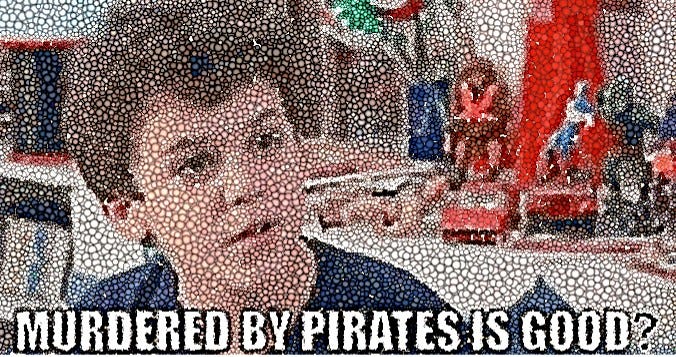Hope and optimism are two very different things — though we often confuse them.
Hope is a flicker in the dark. A belief that, even when things are uncertain or bleak, something better might still be possible.
Optimism, on the other hand, is a conscious choice, perhaps even a posture. It’s the act of interpreting events, no matter how absurd or painful, through a lens of possibility. It’s the belief that things will get better.
The Princess Bride gives us both.
Buttercup, upon hearing that her beloved Westley has supposedly been murdered by pirates, declares: “I will never love again.”
It’s dramatic, fatalistic, and deeply human. We’ve all felt like that. Heartbroken. Certain that the thing we’ve lost is irreplaceable. That nothing good could possibly follow. Maybe it was a recent election, or one some time ago. Maybe it was something far more personal and devastating, like the loss of a loved one.
In stark contrast, our movie’s grandson’s reaction to the (spoiler alert: fake news) of Westley’s demise is an enthusiastic “Murdered by pirates is good!” Delivered casually, it’s practically a throwaway. But it shifts the mood — and with it, the viewer’s expectation. It’s the first glimmer that maybe, just maybe, this isn’t the end of Westley’s story.
In life, the space between “I will never love again” and “Murdered by pirates is good” is where we find ourselves, dare I say, daily. And by we, I’m talking about the society we’re living in. One person’s celebration is another’s heartbreak. The unceasing cavalcade of “breaking news” either breaks us or whips us into a frenzy, depending on how the story is framed and who is listening. In short, these two sentiments are the gap between despair and determination. Let me explain. No, there is too much. Let me sum up:
🌟Hope as Survival Instinct
For years I used to quote the sentiment that “hope is not a strategy.” And in business I do believe that’s largely still true. It comes off as laziness or naiveté. But in life, specifically in managing our own expectations, hope can be a strategy. Of course, strategy without action is nothing more than poetry. Hold this thought.
In the face of loss, be that a job, a relationship, a dream; hope gives us the energy to imagine a different outcome. Without it, we stagnate. But with even a shred of it, we can start taking steps forward again. And that’s where the action comes. We must take steps forward or hope fades. The movie doesn’t really explore the years between Buttercup’s loss and her engagement to Prince Humperdinck, but one would imagine she found some reason to go on, even as she vowed to never love again. She had no evidence that Westley was still alive. But she doesn’t forget him. Her grief is loud, but her love remains.
Sometimes, the thing that keeps us moving is not certainty, but commitment. One step forward at a time, no matter how excruciating or seemingly trivial. Sign a petition? Attend a march? Write a blog? One step. Then another. And another.
🌈Optimism as Reframing
Arguably, the natural progression of hope – it’s outcome perhaps – is optimism. “Murdered by pirates is good!” teaches us about tone. The young lad isn’t callous, he’s reframing. Tragedy can contain the seed of rescue. It’s true that things often look their worst right before they change for the better.
We all know people like this in real life:
The friend who cracks a joke at a funeral — and somehow it helps.
The coach who sees a humiliating loss as a teachable moment.
The parent who reminds you, mid-crisis, that “this too shall pass.”
In recent months I’ve heard my college students use the term “delulu;” which is Gen Z slang for the word delusional. There is a great divide between optimism and delusion though. The former requires action; the latter is far more passive. Remember, hope without execution is more like hallucination. As such, optimism isn’t a form of denial. It’s choosing to look through a different lens, often with humor, sometimes with grit.
📖 Choosing the Story You Tell
At its heart, The Princess Bride is a story about storytelling. The grandson, early on, is still interjecting. But his “Murdered by pirates is good!” is the first sign that he is growing optimistic that the afternoon with Grandpa won’t be wasted time after all. Never mind that he isn’t yet vested in our hero’s story arc. He’s growing surer and he’s actively listening.
Why? Because his blossoming hope keeps him curious. Because optimism gives him a reason to stay.
And as we all know, by the end, he wants the story to continue.
So should we. No matter how dark things may seem in the moment, our own stories are unfinished, and we have as big a part to play in them as we choose. At least I hope so. And I hope you hope so, too.
Surviving the Fire Swamp is a labor of love that has taken me years to compile and complete. Some of my first essays penned around key aspects of the film were written three years ago. Considering recent global events, rather than simply putting forth what I wrote ack then, I have dramatically updated this submission for the times we are living in today. If you enjoyed this or any of my previous works, I hope you will share them with someone you care about! This is all leading to a book of essays I aim to publish in time for the 2025 holidays.




I’m very much loving these essays.